For many, St. Patrick's Day is an excuse to let loose after a winter of snowy confinement. It's all about imbibing, parading, and reveling. For others, however, it's all about a magical meat – corned beef, served with cabbage.
In Detroit, a pair of family-owned businesses, E. W. Grobbel Sons and United Meat and Deli, have been working around the clock to make sure that restaurants, delis, grocery stores, and wholesalers throughout the country are well-stocked with corned beef to satisfy America's seasonal appetite.
America's oldest corned beef specialists
Walk into the offices of
E. W. Grobbel Sons, Inc. and the first thing you'll see is an electronic ticker counting down the days, hours, and minutes until St. Patrick's Day.
"This is Christmas for us," says Jason Grobbel, the fourth generation of his family to own and operate the Eastern Market-based business, which holds the distinction of being America's oldest corned beef specialist. Jason started working at the family business when he was 13, eventually buying out his siblings in the 1980s. He now works with his children. (His daughter Samantha does brand management for the company, while his son Justin runs product development.)
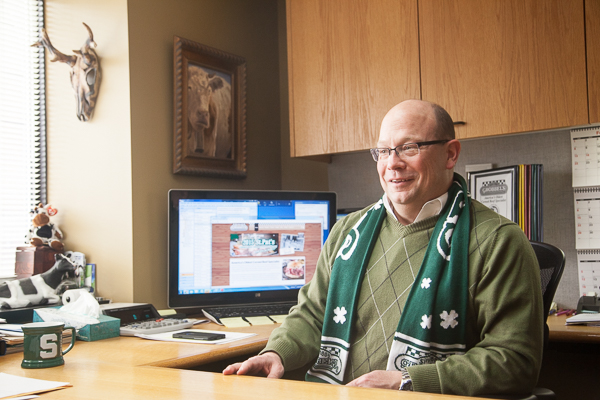 Jason Grobbel of Grobbel's in Eastern Market
Jason Grobbel of Grobbel's in Eastern Market Justin Grobbel, head of product development at Grobbel's in Eastern Market
Justin Grobbel, head of product development at Grobbel's in Eastern Market
Over the three weeks leading up to St. Patrick's Day, Grobbel's has shipped over 300 truckloads of corned beef (each containing 40,000 lbs.) across the country. For half of the year leading up to the holiday, Grobbel's adds 70 temporary employees to its normal workforce of 110 to meet the seasonal demand for its products.
"About five percent of the population eats our style of corned beef regularly, and by 'regularly' we mean three or four times a year. But 30 percent eat it on St. Pat's. Corned beef is a very niche business," says Grobbel.
And it's a niche business that Grobbel's has practically mastered.
Founded in 1883, Grobbel's was originally located on Cadillac Square in downtown Detroit. So, too, was Detroit's Eastern Market. In 1899, Eastern Market moved out of downtown to its present location, though Grobbel's held out. By 1925, however, development pressures downtown were too strong and Grobbel's moved to its current location on Orleans Street in the market district.
Since then, Grobbel's has steadily grown into a national brand. You can find Grobbel's-made corned beef in every Sam's Club and Walmart around the country, as well as in restaurants and grocery stores near and far.
"We've had tremendous growth in the last 10 years," says Grobbel. "We believe it's because of our mission and core values."
Two traditions
While corned beef is closely associated with the Irish and St. Patrick's Day, it's truly an American specialty.
"Corned beef was invented in Europe," says Jason Grobbel, "but not in the form it is consumed today. Really, corned beef comes from two traditions: the Irish-American tradition and the Jewish-American tradition."
Both traditions are alive and well in Detroit.
"Detroit is very much a corned beef town," says Sy Ginsberg, the founder and CEO of
United Meat and Deli, which specializes in Jewish-style corned beef noted for its sweet, garlicky, oniony flavor. "In some cities, they don't pay as much attention to food-related holidays as we do in Detroit. We eat paczki on Fat Tuesday and corned beef on St. Patrick's Day. Detroit, Cleveland, and other industrial cities are in touch with that sort of thing."
And he would know.
According to United's website, Ginsberg "grew up with pickle juice and spicy mustard practically coursing through his veins." Before founding United in 1982, Sy worked for decades in the deli business, starting at the famous Lou's Deli on Detroit's west side when he was just 15 years old. He went on to run two successful Detroit-area delis before he quit that end of the business and began making his own corned beef for distribution.
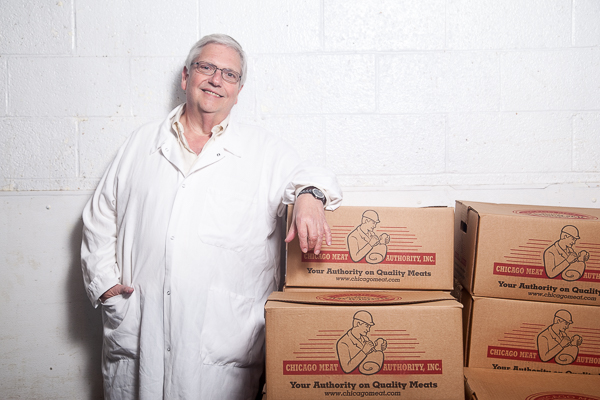 Sy Ginsberg of United Meat and Deli
Sy Ginsberg of United Meat and Deli
Like Grobbel's, United Meat and Deli is just wrapping up its busy season, which Ginsberg says lasts from Christmas until St. Patrick's Day. Since late February, United's production has been running in 12 hour shifts, seven days a week.
Also like Grobbel's, United has seen an uptick in business in recent years.
"We've taken on a lot of retail business for corned beef in the last four years," says Ginsberg. Since then, United began to supply packaged raw corned beef to every Costco in the Midwest and in Texas. In addition to large retailers, United also supplies sandwich shops and Jewish-style delis in Southeast Michigan and around the country.
"Besides manufacturing meats, we are also a deli distributor, selling things like pickles, mustard, and Jewish candies. One customer in Alabama has us send them Jewish rye bread made in Detroit because they can't find it locally."
You can sample Sy's corned beef at restaurants around the city like the Detroit Institute of Bagels, Russell Street Deli, and Mudgie's (where a sandwich on the menu bears his name). Perhaps the best introduction to Sy Ginsberg's famed corned beef, however, would be the Reuben sandwich at the restaurant located closest to United Corned Beef's production facility, the Hygrade Deli.
"I've had Reuben sandwiches in delis all over the country," says Ginsberg, "and Stuart's (the owner of the Hygrade) is dynamite. Nothing comes out as good as Hygrade's as far as I'm concerned."
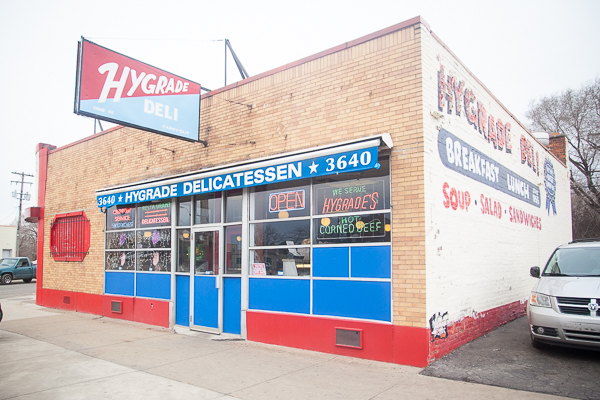 Hygrade Deli on Michigan Avenue
The corned beef process
Hygrade Deli on Michigan Avenue
The corned beef process
Corned beef is made from brisket, which historically was less-desirable than other cuts of beef (the public's attitude towards this fatty cut of meat has changed in recent years with the explosion in popularity of barbecue brisket).
United Meat and Deli brings in anywhere from 120,000 to 160,000 lbs. of brisket per week.
"We typically trim 70 percent of the brisket – mostly fat – and sell the trimmings to other processors who make products like sausage," says Ginsberg.
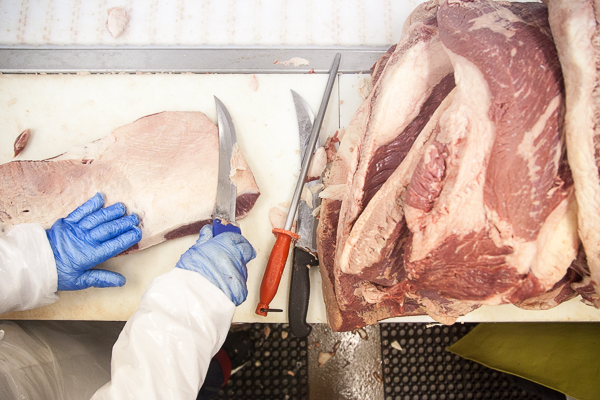 Hand trimming brisket at United Meat and Deli
Hand trimming brisket at United Meat and Deli
Next, the brisket is injected with a liquid that contains salt and all-natural seasonings, as well as a curing agent. It sits overnight in a curing solution, then is packaged in its raw state or cooked for restaurants. (Places like the Hygrade cook the meat themselves, adding their own unique flavors.)
Grobbel's process is similar. First workers hand trim and sort the brisket, which is then marinated and tumbled. The secret to Grobbel's unique flavor is the company's system for brewing its own pickling juices. Next the meat is smoked and cooked, and finally it's sliced and packaged.
Most of the production space in both facilities is refrigerated and as clean and sterile as a hospital operating room.
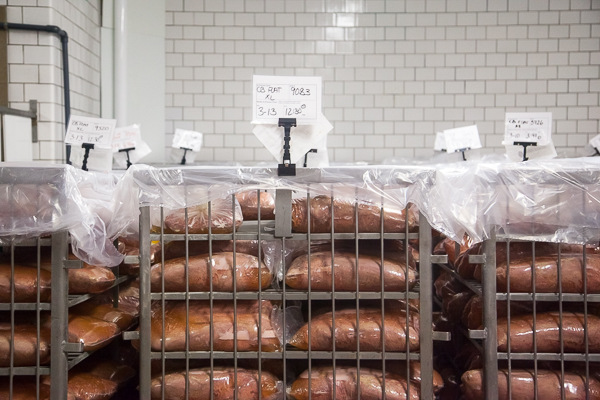 Packaged corned beef at Grobbel's
The future of corned beef in Detroit
Packaged corned beef at Grobbel's
The future of corned beef in Detroit
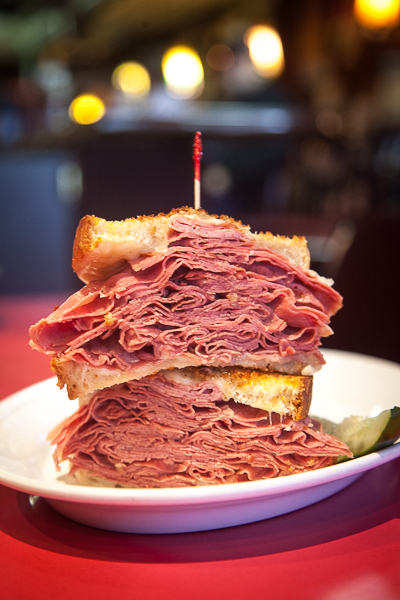 Vivio's corned beef sandwich, featuring Grobbel's meat
Vivio's corned beef sandwich, featuring Grobbel's meatWhile conventional wisdom might tell you that a more health-conscious public spells trouble for the corned beef industry, both Ginsberg and Grobbel will tell you that the future of the business is bright.
At United Meat and Deli, business has expanded so much in recent years that the company has outgrown its 35,000-square-foot facility and has to send some of its products to a cooking facility in St. Clair Shores.
Grobbel's is in the process of adding another 20,000 square feet of production space on to its 40,000-square-foot facility and is looking to acquire land in the market district for a new building.
"We're not interested in growing for growth's sake," says Grobbel. "It's not going to slow down."
---
Support for this series on food and agriculture in Southeast Michigan is provided in part by the Detroit Food and Agriculture Network. See other stories in this series here.
Matthew Lewis is the managing editor of Model D and its sister publication Metromode. Follow him on Twitter @matthewjlew.
All photos by Marvin Shaouni.